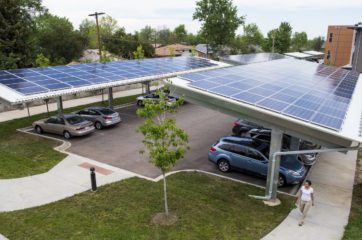The Illinois Clean Jobs Coalition recently announced that a new version of its bill, the Clean Energy Jobs Act (CEJA), will soon be released. CEJA is a bill that invests in clean energy and jobs training to rapidly decarbonize Illinois in an equitable manner.
This release comes at a critical moment for the state — as the United States continues to struggle with the global pandemic and its associated economic fallout, advocates hope that investment in the fast-growing renewables sector can help put the Illinois economy back on track. New adjustments to the bill make it even more relevant to the country’s current dilemmas.
At the same time, the new version of CEJA will seek to increase accountability for Illinois utilities in the wake of a landmark agreement by Commonwealth Edison (ComEd), Illinois’ largest utility company, to pay a fine of $200 million for bribing state-level politicians as part of its lobbying efforts.
Why is ComEd being fined?
The recent bribery case involves associates of a leading Illinois Democrat, Representative Michael Madigan, who is a major center of power in the Illinois government, having been Speaker of the House for decades.
Although Madigan himself, referred to as Public Official A, is not being prosecuted , the Department of Justice says that ComEd “arranged jobs, vendor subcontracts, and monetary payments” for people who work with Madigan. Additionally, “appointing an individual to ComEd’s Board of Directors at the request of Public Official A; retaining a particular law firm at the request of Public Official A; and accepting into the company’s internship program a certain amount of students who resided in the Chicago ward where Public Official A was associated.”
Representative Madigan maintains that he did nothing wrong, and that he will remain in his current role as Speaker of the House, even while other leaders including Governor Pritzker demand more of an explanation from him.
The investigation into this case is ongoing, but the utility company and prosecutors have reached what is known as a “deferred prosecution agreement.” This means the company must pay $200 million and comply with the rest of the investigation, in return for charges being dropped after 3 years. The agreement has yet to be approved by a federal judge.
How will CEJA address utility wrongdoing?
On July 23rd, just five days after the ComEd fine was agreed upon, Illinois State Representative Anne Williams tweeted, “I am in the process of drafting an amendment to #CEJA to end automatic rate hikes & implement strong utility accountability measures.” Rep. Williams is the House sponsor of the bill.
The Illinois Clean Jobs Coalition officially announced new changes to CEJA in a press release and press conference on August 5th. As promised by Rep. Williams a few weeks beforehand, the new version of CEJA will protect ratepayers by stopping “formula rate increases” — increases designed to guarantee utility company profits regardless of changes to markets, potentially at the expense of ratepayers. David Kolata, Executive Director of the consumer advocacy group Citizens Utility Board, explains that utilities tend to like formula rate increases because they “increase the certainty that the utility will get their profit.” As an alternative to the formula rate, CEJA will set up “a regulatory system that is united around encouraging consumer and environmental values.”
The updated version of the bill will also have components that improve regulation of utilities. Kolata notes that as part of the recent agreement, “the U.S. Attorney forced ComEd to make behavioral and managerial changes. We think those should be put in statute and that they should apply to all utility companies.”
The bill additionally will not allow money from ratepayers to go to federal investigations, because “consumers shouldn’t have to pay for wrongdoing,” Kolata explains. Importantly, the bill also requires ComEd to pay restitution.
Finally, the new version of CEJA will change how Illinois regulates utilities by setting up a more modern regulatory regime called Integrated Grid Planning. According to Kolata, “Right now, we’re not seeing a holistic integrated approach” to regulation. Instead, we “need a comprehensive plan that is aimed at the key outcomes of decarbonization, equity, and job creation.”
Other updates to CEJA
In addition to new measures relating to utilities, the updated CEJA bill will have stronger language when it comes to equity, jobs, and clean energy.
According to the coalition, the amended CEJA includes an Equity Points System that will factor into clean energy contracts to incentivize more equitable projects and payments. The new version will also strengthen preexisting jobs training programs so that more localities and individuals can benefit, while creating extra support for small-scale renewables programs. This is crucial for workers in the renewables industry who are struggling during the current economic downturn.
The newest changes to CEJA will make it even more helpful to ratepayers who are hurt by corporate corruption, and will enable the state to rebuild from the current economic and public health crises in a way that facilitates decarbonization.
See this page page at the Clean Jobs Coalition’s website to express your support.









